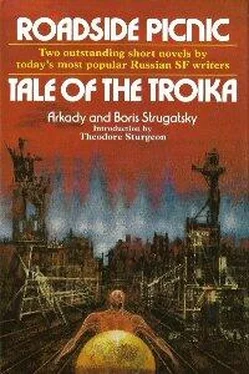Arkady Strugatsky - Tale of the Troika
Здесь есть возможность читать онлайн «Arkady Strugatsky - Tale of the Troika» весь текст электронной книги совершенно бесплатно (целиком полную версию без сокращений). В некоторых случаях можно слушать аудио, скачать через торрент в формате fb2 и присутствует краткое содержание. Год выпуска: 1977, ISBN: 1977, Издательство: Macmillan, Жанр: Юмористическая фантастика, на английском языке. Описание произведения, (предисловие) а так же отзывы посетителей доступны на портале библиотеки ЛибКат.
- Название:Tale of the Troika
- Автор:
- Издательство:Macmillan
- Жанр:
- Год:1977
- ISBN:0-02-615170-7
- Рейтинг книги:4 / 5. Голосов: 1
-
Избранное:Добавить в избранное
- Отзывы:
-
Ваша оценка:
- 80
- 1
- 2
- 3
- 4
- 5
Tale of the Troika: краткое содержание, описание и аннотация
Предлагаем к чтению аннотацию, описание, краткое содержание или предисловие (зависит от того, что написал сам автор книги «Tale of the Troika»). Если вы не нашли необходимую информацию о книге — напишите в комментариях, мы постараемся отыскать её.
and a number of points underlined are true of modern day bureaucracy and science, it met with a cold reaction during Soviet times and was quite difficult to obtain, therefore achieving a “forbidden fruit” status.
Tale of the Troika — читать онлайн бесплатно полную книгу (весь текст) целиком
Ниже представлен текст книги, разбитый по страницам. Система сохранения места последней прочитанной страницы, позволяет с удобством читать онлайн бесплатно книгу «Tale of the Troika», без необходимости каждый раз заново искать на чём Вы остановились. Поставьте закладку, и сможете в любой момент перейти на страницу, на которой закончили чтение.
Интервал:
Закладка:
Tale of the Troika
by Arkady and Boris Strugatsky
PROLOG
The story began like this. One day, at the peak of my work rush, as I was sweating over a lost shipment intended for the Kitezhgrad Magicotechnical Plant, my friend Eddie Amperian showed up in my office. Being a polite and well-brought-up person, he did not materialize unceremoniously right in the rickety visitor’s chair, or barge in obnoxiously through the wall, or hurtle through the open transom like a catapulted cobblestone. Most of my friends are always in a hurry, late for something, or behind schedule, and they always materialize, or barge in, or hurtle through shamelessly whenever they feel like it, eschewing normal communications. Eddie was not like them: he modestly entered through the door. He even knocked, but came in before I had time to answer.
He stopped in front of me, said hello, and asked:
“Do you still need the Black Box?”
“Box?” I muttered, my mind still on the lost goods. “What can I tell you? What box do you mean?”
“I’m disturbing you, aren’t I?” polite Eddie said carefully. “I’m sorry, but the boss sent me over. You see, approximately an hour from now the new elevator system will be launched for its first run beyond the thirteenth floor. We’ve been offered a ride.”
My mind was still saturated with the noxious fumes of inventory jargon, and all I could say was:
“We were supposed to have lost an elevator at the thirteenth floor of this year?”
But then the first few bits of Eddie’s information penetrated my gray matter. I laid down my pen and asked him to repeat what he had said. Eddie did so, patiently.
“Really?” I asked in a faint whisper.
“Absolutely,” Eddie said.
“Let’s go,” I said, getting the folder with the requisitions out of my desk.
“Where?”
“What do you mean where? To the seventy-sixth floor.”
“Not just like that,” Eddie said, shaking his head. “First we have to drop in to see the boss.”
“What for?”
“He asked us to. There’s some problem involved with the seventy-sixth floor. The boss wants to brief us.”
I shrugged without arguing. I put on my jacket, pulled out the requisition for the Black Box from the folder, and we set off to see Eddie’s boss, Fedor Simeonovich Kivrin, head of the Department of Linear Happiness.
An unbelievable hubbub reigned on the platform of the first floor in front of the elevator cage. The door of the shaft was open, as was the door into the elevator itself. Many lights were burning, the mirrors were sparkling, and the polished surfaces gleamed. Under the old, peeling banner that proclaimed “Let’s Get the Elevator Up by the Holiday!” huddled a crowd of curiosity seekers and people wanting rides. They were all listening politely to Modest Matveevich Kamnoedov, the deputy director, who was giving a speech before some electricians from the Solovetsk Boiler Supervisor’s Department.
“This must be stopped,” Modest Matveevich exhorted. “This is an elevator, not some spectroscope or microscope. The elevator is a powerful means of locomotion—that’s primary. It is also a means of transportation. The elevator must be like a dump truck: it gets you there, dumps you out, and comes back. That’s point one. The administration has long been aware that many of our fellow scientists, and that includes some academicians, do not know how to use an elevator. We are combating this, and we will put an end to it. There will be examinations for licenses for operating an elevator, and past services to us will not be taken into consideration … the establishment of the title of Senior Elevator Operator … and so on. That’s my second point. And on their part the electricians must guarantee uninterrupted service. There’s no use in falling back on objective conditions as an excuse. Our slogan is ‘elevators for everyone.’ No matter who. The elevator must be able to withstand the entrance of the least-educated academician.”
We made our way through the crowd and moved on. The pomp of that improvised meeting impressed me greatly. I had the feeling that today the elevator would actually, finally, be running and would continue running maybe for as much as twenty-four hours. That was impressive. The elevator had always been the Achilles’ heel of the institute and of Modest Matveevich, personally. Actually, there was nothing special about it. It was an elevator like any other, with its good points and its bad points. As befits a proper elevator, it constantly strove to get stuck between floors, was always occupied, burned out the bulbs that were screwed into it, and demanded irreproachable behavior and a deft touch with the gate. Getting into the elevator, one could never say with any certainty where and when one would be getting out.
But our elevator did have one unique trait. It could not stand going above the thirteenth floor. I mean, of course, that there are recorded instances in the history of the institute of individual skilled craftsmen who managed to overcome the contrariness of the mechanism and, giving it its head, went up to absolutely fantastic heights. But for the average man, the endless territory of the institute looming above the thirteenth floor was just a blank. There were all kinds of rumors, some contradictory, about those territories, almost completely cut off from the world and the influence of the administration. It was maintained, for example, that the one hundred twenty-fourth floor had an exit into an adjoining space with different physical properties, that on the two hundred thirtieth floor lived a mysterious race of alchemists—the spiritual descendants of the famous Union of the Nine established by the enlightened Indian king Asoka, and that on the one thousand seventeenth floor, the old man, his wife, and the Golden Fish still lived on the shore of the Blue Sea.
The floor that interested me the most, and Eddie too, was seventy-six. It was there, according to Inventory Control, that the Ideal Black Box was kept, indispensable to a computer lab. A talking bedbug lived there too, and the Department of Linear Happiness had long needed it. As far as we could tell, the seventy-sixth floor was a sort of storehouse for the anomalies of nature and society, and many of our employees were eager to dig their claws into that treasure trove. Fedor Simeonovich Kivrin, for example, dreamed of the granulated Grounds for Optimism that were supposed to be there. The guys from the Department of Social Meteorology were desperate for at least one qualified Cold Shoulder—three were indicated as being there, and all three had an effective temperature close to absolute zero. Old Christobal Joséevich Junta, director of the Department of the Meaning of Life and doctor of the most unexpected sciences, was champing at the bit to catch the sole remaining specimen of the Wingless Earthbound Dream and stuff it. Over the past twenty-five years he had tried no less than six times to break through all the barriers to the seventy-sixth floor, using his formidable powers of vertical translocation. But even he was unsuccessful: all the floors above thirteen, according to the clever plans of the ancient architects, were solidly blocked against any type of translocation. Thus a successful launching of the elevator would have signified a new epoch in the life of our collective.
We stopped outside Fedor Simeonovich’s ofEce, and the old house spirit Tikhon, clean and presentable, cheerily opened the door for us. We went in.
Fedor Simeonovich Kivrin was not alone. Olive-hued Christobal Joséevich Junta was casually draped in the soft armchair behind his large work table, sucking on a smelly Havana cigar. Fedor Simeonovich himself, his large fingers tucked in his colorful suspenders, was walking up and down the office with his head bowed. He was trying to step along the very edge of the Persian carpet. Crystal vases on the table held the Fruits of Paradise: the large, rosy apples of the Knowledge of Evil and the completely inedible-looking, but nevertheless worm-eaten, apples of the Knowledge of Good. The porcelain dish at Christobal Joséevich’s elbow was full of cores and butts.
Читать дальшеИнтервал:
Закладка:
Похожие книги на «Tale of the Troika»
Представляем Вашему вниманию похожие книги на «Tale of the Troika» списком для выбора. Мы отобрали схожую по названию и смыслу литературу в надежде предоставить читателям больше вариантов отыскать новые, интересные, ещё непрочитанные произведения.
Обсуждение, отзывы о книге «Tale of the Troika» и просто собственные мнения читателей. Оставьте ваши комментарии, напишите, что Вы думаете о произведении, его смысле или главных героях. Укажите что конкретно понравилось, а что нет, и почему Вы так считаете.












